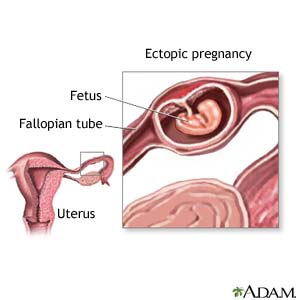The originating document has been archived. We cannot confirm the completeness, accuracy, or currency of the content.
Ectopic Pregnancy
Medically reviewed by Drugs.com. Last updated on Feb 20, 2025.
Ectopic pregnancy occurs when a fertilized egg attaches and begins to grow outside of the uterus. The most common place for this to happen is in the fallopian tube. This is sometimes called a tubal pregnancy. The egg can also implant on the outside of the uterus, on the ovary or cervix, or in the abdomen. The egg may begin to grow, but the pregnancy cannot continue normally. Ectopic pregnancy can cause heavy bleeding and may be life-threatening.
 |
DISCHARGE INSTRUCTIONS:
Follow up with your gynecologist within 2 days:
You will need to return for follow-up exams, treatment, or blood tests. Write down your questions so you remember to ask them during your visits.
Related medications
Treatment options
The following list of medications are related to or used in the treatment of this condition.
Contact your gynecologist if:
- You have a fever.
- You have questions or concerns about your condition or care.
Return to the emergency department if:
- You feel lightheaded or like you are going to faint.
- You have increasing abdominal or pelvic pain or heavy vaginal bleeding.
- You have shoulder pain.
- You have chest pain or trouble breathing.
Learn more about Ectopic Pregnancy
Treatment options
Care guides
Further information
Always consult your healthcare provider to ensure the information displayed on this page applies to your personal circumstances.
